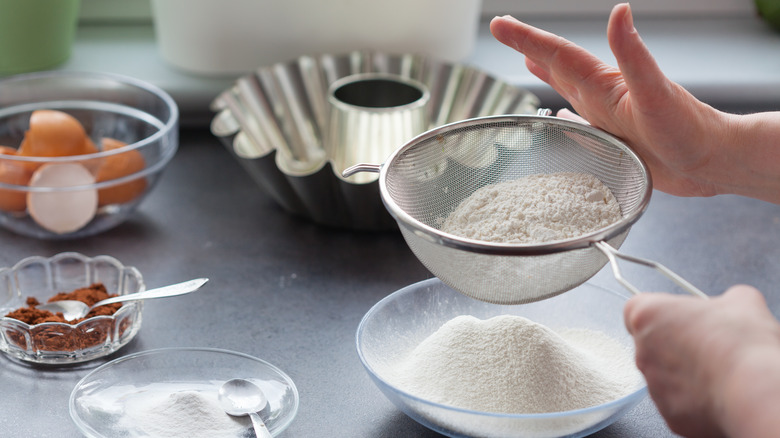Should You Sift Flour Before Or After Measuring? Here's What Ina Garten Says
Baking bread, cakes, or anything similar is an art. Creating your masterpiece requires precise measurements, exact temperatures, quality ingredients, and patience. Sifting is often debated — some say you must sift flour, while others claim it is unnecessary (via Cake Decorating Corner). Both sifters and non-sifters alike are devoted to their methods, causing even more confusion for those unsure about the topic.
Southern Living says that sifting flour breaks up lumps and bumps in the dry ingredient. It also makes flour smooth and provides a more precise measurement. Plus, sifting makes the flour lighter, thus easier to mix into the other ingredients in your recipe. Better Homes & Gardens claims that sifting isn't necessary for all recipes. The site says sifting the elements required for light and fluffy foods is beneficial — think chiffon cake and sponge cakes. In contrast, crisp and chewy desserts don't need the extra step.
If you've decided to sift the flour in your recipe, the question remains — should you sift before or after measuring it out? Ina Garten's tips will answer your question.
Sift before measuring
Garten says, "baking is an exact science." In a Food Network YouTube video, she explains the art of sifting flour with a sieve. Should you sift before or after measuring the dry ingredient? Garten explains that flour is sifted because it ensures even measurement. It's easy for flour to become compacted, causing a discrepancy from one measuring cup to the next.
The "Barefoot Contessa" says to sift the flour before you measure, spoon it into the measuring cup, and level with a knife or your hand. If that seems too tedious, she also says you can lightly fluff the flour with your cup, then scoop it up and level it off with a knife. The goal is not to allow the flour to become compacted.
Martha Stewart also mentions that sifting ingredients are beneficial, especially when baking cakes and pastries. There are times, however, when it is not helpful. Stewart says to read your recipe carefully. Some recipes call for ingredients by weight instead of volume, so sifting in this instance can affect the food's flavor.
Whether you love baking cookies, cakes, or bread, keep Garten's sifting tip in mind the next time you're in the kitchen.

